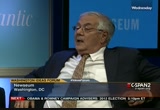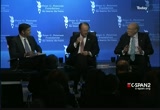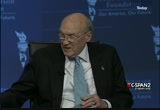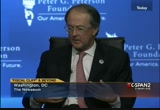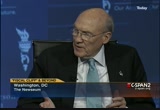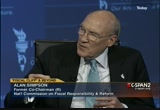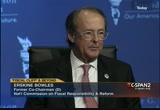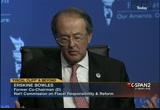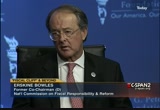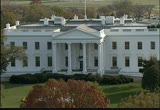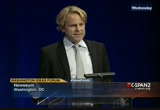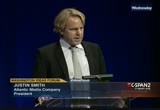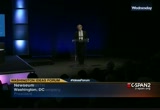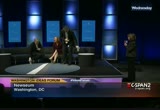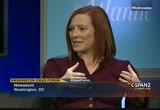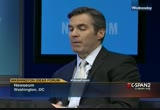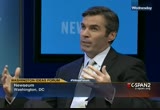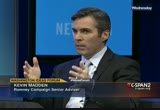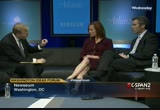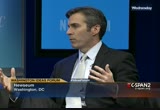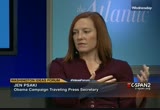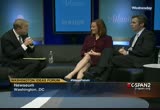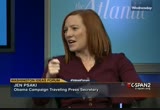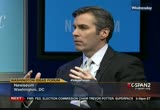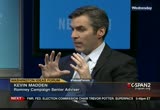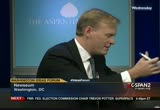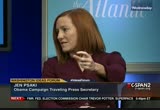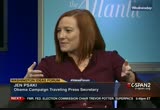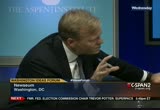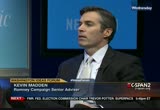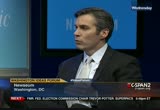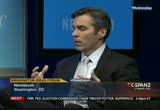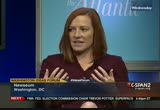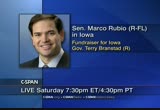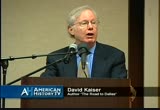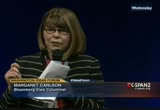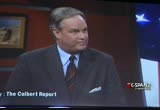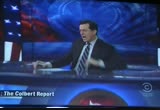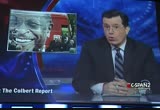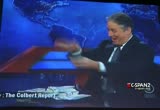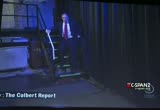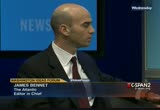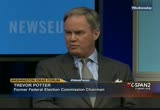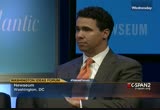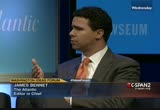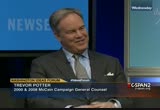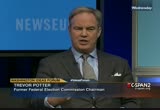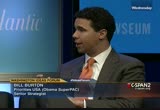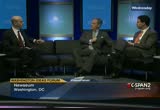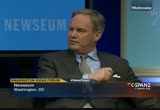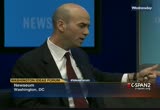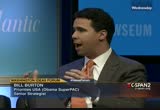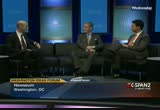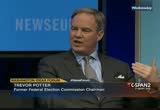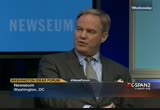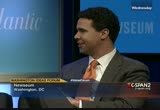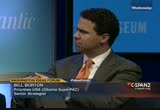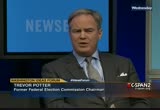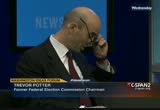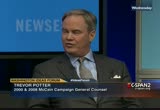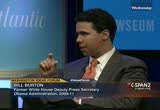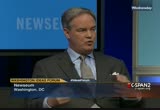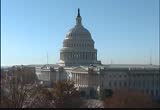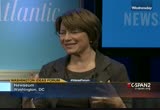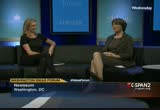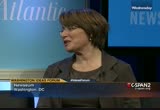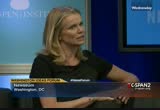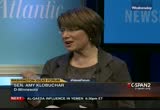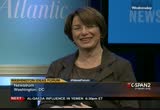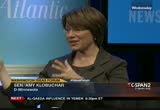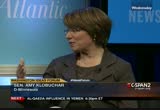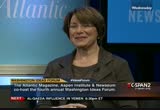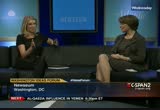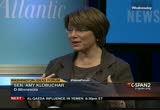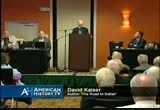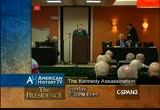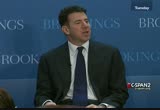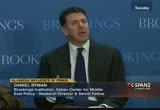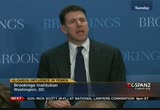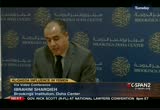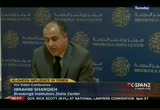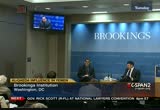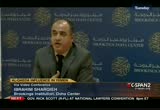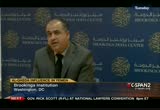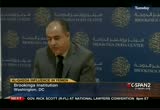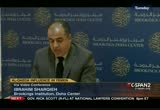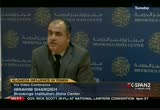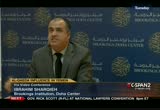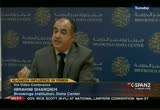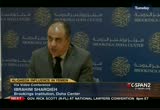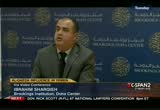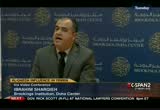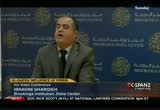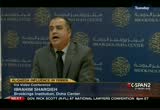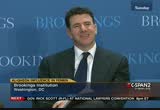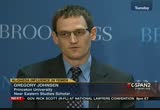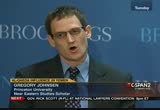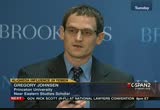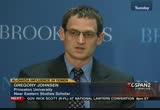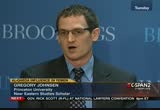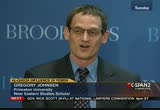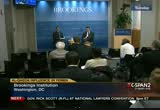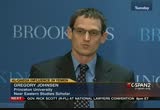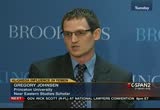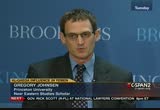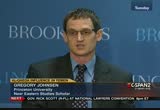tv U.S. Senate CSPAN November 16, 2012 5:00pm-7:00pm EST
5:00 pm
lot of other people and i am optimistic reality will be better. i think you will see the health care bill and the financial reform bill provides stability. the sun will still go up in downtown new york. and very rich. the question, how will the republicans react. there are people who said let's be conservative, back off of the anti-gay stuff and anti-immigration stuff and bring more revenue to the federal government. with things getting better, less anger in the country as a whole, that fuels occupy and the tea party is a very good chance that you will get back to legitimate competition between the parties of the kind we had before. ..
5:01 pm
5:02 pm
there and listen to us and they tell their position that they really haven't been out there. but what is disturbing to me is maybe the democrats could gain if we do go off the cliff and then republicans maybe we could gain and go over the cliff i think that is disastrous to even think in those terms and like erskin said, but in your country. i am not quite won over by it all come and a couple years ago you were the ones that said we are going to go over the cliff and i said no i think they will go over the cliff. erskin holds out for another 30% chance. >> i just think we can't be stupid enough to do it. we can resolve this problem now and by making some very tough but doable compromises. if we go over this question and
5:03 pm
we don't make a deal immediately thereafter here's what will happen and i think that is about a one-third probability that we are going to go over the cliff and nothing is going to happen. what will happen is that you will see movies and fitch downgrade our credit and they will join s&p and they may take it down again. you will see the stock market that will say dhaka, we never thought that they would be stupid enough to do this. i think you'll see a stock market will crash. and i think that you will see businesses really slow back on hiring. they will slow back on their capital expenditures come on their investments. i think you will see consumer confidence godown and we will be facing a mess because what happens? the economic effect of going over the cliff is enough to slow economic growth by about 3%, we are growing at 1.5% today so that is enough to put us back into a recession. about 2 million people will lose their jobs and unemployment will go down to 9%.
5:04 pm
>> why would we do that when there are good alternatives we can do by simple compromises during a lame-duck session? >> senator simpson ample compromises on the table. shouldn't the strength for the negotiations be the plan that you produced in december, 2010? have things changed in the interim period the evin simpson-bowles isn't the right answer? >> certain things have to be adapted to that but what i get a kick out of is when we put this in vv out they were just chuckling. they somehow put something together and how did they get durbin and colburn into it? they must have drugged them. yet they have been just tremendously enjoyable parts of this. in fact they really are superb men and white and patriotic and of course the stereotyping is out there and that hurts everything.
5:05 pm
they say my god, not him. is colburn part of your plan? and andy stearns said after a few weeks who should i vote for? all i know is they are not laughing now and this is like a stink bomb in the garden party. they don't like. it's a curse. the real estate guys, and everybody in that list of people that have gained tremendously from tax expenditures are up with their fangs out right now. we knew this would come, but they never dreamed that they would be talking about this plan, and now they are not just talking about what they're talking about implementing parts of it and they are in shock. and you haven't seen anything yet if you don't think that the savagery in the next few weeks putting the heat on these guys in congress from every one of those people are going to lose when we go through all the tax expenditures and gave the people of america what they needed to tax with 8% to 70 grams, 14 up
5:06 pm
to 210. we did all that. it's all there. it's all in the 64 page report, and it's still there and it isn't going away. >> our hope is that during this lame-duck, you know, you can't rewrite the tax code in 48 days, and for us we are -- the american people should be disappointed. while the rest of the country has been having a, you know, what can best be described as a very fragile and economic recovery. in washington all they've been having is an election. and if any business was facing the equivalent of a $7.2 trillion hit and it's got and that's what we have over the next decade that is what the economic effect of this will become the expiration of the bush tax cut, the expiration of
5:07 pm
a payroll tax and the patch that is put in order so that i won't hit the middle class expiration of the unemployment benefits, the sequester which is the senseless across-the-board cuts that came about because of the failure of the super committee. and no business tries to balance their books doing across-the-board. you go in there surgically and try to do the things that have the lease adverse effect on the productivity. so today we have about 48 days left we just went through this election. isn't it amazing that during the election and all four of the debates toward fiscal clift was never, ever mentioned, not by the reporters and not by the candidates. islamic no mention of the solvency of social security for 75 years or what to do with medicare which is on an unsustainable course. i interrupted, but the debate took place, and nobody ever got
5:08 pm
into the two big things that are driving this country. >> every day every news organization and what is the senate doing? the senate went home. they were only going to work for 20 days. if this was a business he would be working trying to resolve this issue. so our best hope is to get a framework deal that will call for $4 trillion worth of deficit reduction over the next decade but it's got to have real substance and clarity for the markets to think it's real. it's going to have to have a significant down payment. it's going to have to have a real time line and it's going to have to have a fail-safe provision that is realistic, not one that somebody is going to try to walk away from like this current sequester and i would say that it's going to have something like 67 votes in the senate to override so it will be hard for these guys to squirm
5:10 pm
now that the idf forum hosted by the atlantic, the aspen institute and the museum. this panel linwood remarks from campaign advisers to president obama and mitt romney and advice they gave to each candidate in the weeks leading up to the election. this is 25 minutes. >> my name is justin smith and i am the president of atlantic
5:11 pm
media company and i am delighted to welcome all of you to the fourth annual washington ideas from which is convened by the atlantic, the aspen institute and is the newseum. as many of you know the atlantic has been the business of journalism and ideas for a very long time. since 1857 to be exact. but it wasn't until nine years ago that we to get serious about creating the most interesting and ambitious forum for the discussion on politics and business and science and technology and the arts and it was thanks to the division of the accomplished author and journalist walter isaacson who's the ceo of the aspen institute who approached the owner of the of cleantech, david bradley, about partnering to create a new event called the has been ideas festival. in less than a decade, the house and ideas festival takes place every summer in the beautiful aspin campus in colorado has become an influential leader in the global event arena.
5:12 pm
for the success we decided four years ago to take elements of that great show on the road and with the partnership of general and the newseum, the washington ideas for rahm was born. you'll hear the greatest journalists interviewed felt makers and leaders to discuss topics as varied the future of the entrepreneur should, global health, education, the future of china and many more subjects. so if you bear with me i would just like to offer some words of appreciation or the organizations and people that have made this event possible. it starts at the top of the list with a big thank you to margaret is the editorial director of the washington ideas for rahm. she's not only wonderful and talented but she's been the creative force behind the vision of this event from the very beginning. thank you, margaret. [applause]
5:13 pm
decedent would also not be possible without -- i was looking for an adjective that captured this gentleman and i came up with this one, electric, steve clemens who is with the atlantic now and has been a great source here. of course the newseum shelby coffey who's been a key architect of this event. this year we are doing something different. we welcome a new partnership in the harvard institute of politics who've carried of the elections in side of the program track and so i would like to extend a sincere thanks to the director of the harvard institute of politics. and now i would like to thank our important presenting underwriters have made this event possible, and they are altria, bank of america, comcast, exxonmobil, thompson reuters and united technologies and the supporting underwriters of the american federation of teachers and the center for auto quality, and then for drinks tonight well-deserved drinks at
5:14 pm
the reception, the underwriter is google. finally if you're housekeeping notes. we are going to run the program straight through without breaks so you can infer what that means. please, silence your cell phone and this is just your ringer because we want you to keep yourself owns tweet with the hash tag #ideasforum for others here but also those watching the event by the atlantic dhaka, overlie of a stream so that is it for the welcome. thank you for coming and please, enjoy the show to the [applause] >> you need a microphone.
5:15 pm
>> thanks everybody for coming this afternoon. i hope that you enjoyed the morning. welcome to our fox and friends said. we will call with margaret and friends. the traveling press secretary for the obama campaign and kevin madden for the romney campaign are joining us. they spend a year on the road with a promise of hot food, clean underwear and an office in the west wing keeping them going. now they are going to join us and tell us what life is really like and john is going to get it out of them, right? what goes on behind the curtain? john dickerson, cbs news. >> don't forget slate go too. ' and again the best online magazine other than the atlantic, slate. >> i can't tell whether we are in the living room or a therapy room.
5:16 pm
>> we've got 20 minutes until the show departs for i hope can tune or something. let's start with both of you on the candidates in the last campaign and now we are here for this one. one was different this time around? >> nothing. [laughter] >> you know, it was entirely different from the beginning. there is a lot that has been written about what was different. of course in the first campaign there was this amazing wave of excitement and enthusiasm and many people were projecting what they wanted the than candidate senator obama to be. and this time there was no question it was hard fought. there were harder days. there wasn't a wave at the end as we all know. a very i will call him very senior administration officials said to me, which i think this is a very good analogy for it that the first campaign was like being in a relationship where everything is gleeful and you are happy and you don't see
5:17 pm
anything wrong in the other person and you just kind of ride the waves in this happiness and the second campaign was like after you've been married for a few years and have a couple of kids maybe you have had some squabbles, financial disputes but at the end of the day, you know that you love the person that much more and that is how i think a lot of us felt that it was hard fought but it felt that much sweeter at the end. >> i found that the speed was very different from the 2008 campaign. i remember in the 2008 campaign just like how we do our jobs in the 2008 campaign i had signed up for facebook the first time just so i could see what governor mitt romney's facebook page looked like. that's how i found out about facebook and like two months later i lolled back on because it had gotten hacked into and i found out that i had friends from grammar school who were looking for me. [laughter]
5:18 pm
>> farmville. >> we also didn't have twitter. i remember calling a guy before a court for governor romney i worked for john boehner than in the majority's office and i called our digital guy and i said tell me about twitter how it is used and what is going to work. he said you don't need to know that. it's not a big thing. and here we are now i notice in this campaign so much of what we did was driven from the bottom-up through twitter. when i was on the plane we would do it different, jen on air force one and i was doing it on what we called here force one. [laughter] i would play gaffle for 15 or 20 minutes and by that time i would come back from the plane and i would see on twitter that it already made news. >> when using people you mean reporters. [laughter]
5:19 pm
>> that was on the free to be you and me reporters and people. but this was kind of backstage conversation you were watching played out on twitter but it was more important for you with the journalists using. >> it became an incredible news aggregative you could see what journalist you were covering from the outlets that are more left-leaning and see what they were saying and folks on the right were saying and folks that are supposed to be in the middle and also the operatives are saying on the right and left and with the outside groups are saying and you have sort of got a good snapshot of where the dialogue was going. what i found was quite stunning was the speed with which i worked on the 2004 campaign as well and president bush's re-elect and you have until
5:20 pm
probably 3:30 in the afternoon to sort of get your message together and start calling through to the reporters and the state's before they started ripping the copies. now what happens is a posting goes out and throughout the day is updated and i just found we didn't have a cycle it was every single day was just a nonstop news cycle. >> would seem to me to put a premium on the focus because you've got thousands of waves of questions from us and news cycles going by so what was the one thing if you have to keep your eye on the prize from day after day, what was it for you? >> in terms of the media there is still a huge power in television and local television, national television, people watch that's how they get their news so that's part of it i think. the of the peace and this was the same for the romney team there is a wider strategy around
5:21 pm
every debate plus those you're supposed to send out and listings that you wanted to trend along those lines, so i think the challenge overall was i would once related to our 13 or 14 year old girls not being distracted by all of the different mediums, the tweets and the different posts and being focused on what your message was and what you were trying to get across that day and in the weeks ahead. >> we have so many instruments now at our disposal. i liken it to a symphony which is that every single one of these instruments has to be playing the same note over and over all day long in order to break through. and whether it is, you know, like she said, what is our twitter strategy, which is the strategy for the speech and making sure that the digital side of things is integrating everything including your volunteers on what they are saying out on the field and what you're sarah gets are saying now talk radio and on cable tv and
5:22 pm
all that there was a very big challenge. >> the point is not just the trigger conversations because it sets conventional wisdom within filters of the news stream. >> yes, and it becomes a shiny ball i think people will chase whether it is somebody tweets of the crowd size or about something that governor mitt romney said on the trip or something that president obama said at an event, and it becomes a kind of a snowball you have to deal with and you can't deal with other things. estimates like tnt for the news cycle in other ways. and oftentimes, too, it would it would contribute to it was of course but larger to it was reporters because of twitter i think they become much more competitive. it's a competition between who can be the snarky and stand put up and create the most and get something that is granted more
5:23 pm
clicks and make more news, so that competition between the media organizations as well is something that you also had to manage on the communications. >> there are people who are also tweeting and 455 that have been in the news business for 30 years and they are all tweeting and there is a level that doesn't necessarily reflect the experience or the perspective that to the plea the news has. >> what the answer this question. you felt at times like the conversation was happening in that the 140 characters based, and while that was happening over here there was a big campaign going on over here that this conversation was not intersecting with. was there a moment or a turning point whether somewhere in the campaign the conversation over here just got a totally wrong? there are probably many but is there one that you can think of? >> the example that is very relevant and nobody talks about
5:24 pm
this for us, the convention speech is purposefully done in a way that was done. was the most amazing speech. however, it gave the american people a plan and an understanding of what he wanted to do moving forward and how he wanted to do it and that's why we saw with a post and gives us a road map and afterwards this is kind of disconnect where we are all on this trip in florida and we are reading all of the analysis and all of the analysis says this is terrible, it's horrendous, the campaign is over and all these things and we were thinking know we tested it, people like the speech. they liked what he had to say and it ended up being the robot for us moving forward. >> i don't think that the war on women materialized in the larger electorate the way that it materialized in the sort of small day-to-day comment that we
5:25 pm
have on cable news and blogs and twitter we ended up having a really difficult marriage gap that affected our ability to win but i think that if you look at some of the exit polling and where we were with winning in the economy and at least having a manageable gender gap where that wasn't as large i think that is something that was cabinet for a lot of the cable tv bookers and for the sort of outrage index the oftentimes comes with the dialogue that we have in the campaigns but i don't think that it materialized as a big difference that we saw in the campaign. >> i was talking to somebody in the operation who said when you're talking about the polls and the evaluation of what happened in the end and why they were shocked it was a lot closer. they said we never ran the model of what it would be like if the democrats turned out the way they did. can you talk about that and what the surprise was there at the
5:26 pm
end? >> we looked at a lot of the models in 2004, 2008 and we just figured with enthusiasm that we have and the enthusiasm that the democrats have right now we just don't believe that it's going to be the same turnout and that the electorate is going to look exactly like it did in 2008 and so there's been a lot of discussion since about how this electorate is changing to reva i don't think that the obama campaign gets enough credit for a actually changing the electorate. i think the model was extraordinary. they did very well and they made sure that they had the exact model of the electorate that they needed to win. i talked to a lot of the folks i work with on the ground in the states like ohio and we would see these come out that would show that we were four points down and i would say that is based on the model. it's going to be a model that shows there were seven points
5:27 pm
more democrats. so the very best is going to be plus five. it turned out it was exactly what the public polls had seen and the folks for modeling their electorate on internally so that is unfortunate, but we just didn't believe that it was going to happen and that is one of the hard things about making assumptions and guessing in the turnout but they don't get enough credit for actually forcing or creating that composite that they needed to win. >> is there ever a time in retrospect, you know, gracious in the campaign but when you are going through its it's someone that had a tough economy and there was in the enthusiasm across the board. was there ever a big sort of dark scary thing hanging out there that you were worried about that was sort of one version what is the turnout if they were not what they were? what is the big what if that kept you what that might.
5:28 pm
>> young people aren't going to turn out worried. you worry that there is a huge surge in growth in the latino population. the president ended up winning more latino votes because in part the growth of the population than anyone in american history. so that requires getting people out, getting them registered and getting them out. this is one of the reasons we early voting was such a big part of the strategy. ogle, nevada, ohio, like a couple percentage points that makes a difference. the people that are less likely voters but there are always moments and there are moments during the campaign where you think -- >> how bad after that first debate? >> i'm surprised that's what you brought up. [laughter] >> the first debate as someone that's worked on and off for
5:29 pm
about six years and i was there the whole time from beginning to end in 2007, 2008 the first was very important for us and it's probably a defining point for us and it reminded a lot of loss of when we lost the new hampshire primary in 2008. when you kind of thing we are in a good place and then you think hold on. the first debate going into, you don't know how you are going to do. no one knows. you can talk to everyone who's been a part of its but we didn't know how it was going to go. afterwards we didn't actually think it was as bad as everybody else did and we all went out on tv and talk to everybody in the was only until a day or so later. >> but you had seen twitter which was melting. >> twitter was melting down, my computer was on fire. it was important for us because it was a hunkering down for us. it was a reminder that which we
5:30 pm
knew all along that this was going to be very hard fought. the president took a lot of it on himself and was kind of baulking everybody at the mountain. but it was important for us because we needed to have that moment. when his back was against the wall. it was important for all of those reasons. >> tell us, take up a little bit preparing for the first debate he had not a great september so his back was against the ball going into that first debate. give us a little sense of mitt romney -- people have a little bit of a difficult time getting a hold of him as he prepares for that first debate and then comes out of it. >> that is one of the things i said if i could just get this guy into everybody's living room for 90 minutes and let them see the issues that he has and his ability and his vision for the country he would be able to win
5:31 pm
this something we would better be prepared for the d dates to sit down for 90 minutes and sort of cut through a lot of the 32nd advertising that had been bombarding people with negative information about governor romney i was very surprised. i think largely because i always expect the worst happen. so tweets equipment that you are always kind of pleasantly surprised in the end. but i thought portman was so extraordinary, he was so good at just getting at governor romney and really putting him on the defensive, and so i thought the performance -- once the governor got out there and he did get comfortable and he did see this opportunity to cut through and talk directly to the voters that was something that was very true. so once he had that up there and he knew he had that opportunity to talk up the voters he did and
5:32 pm
we saw the results. >> what do you think he will do now? when we were on the plane in the last few days i said a lot of them as we get closer and closer they are red to try to force -- force questions on you and i don't think that we never really talked about you don't go through the brutality of these things without actually thinking that you are going to lose, but being depressed guy to put him on the couch and prepare him for these questions and i said they are going to ask you what do you do and he said if i run and good to be very excited because i might get to do all the things i've been talking about over the last six years, and i get to put my plan into action but if i lose i will also be very excited because i get to go on with my life. i have a great life, a wonderful wife and family and there are other things i can still do so the other thing that he can still do i think he is probably going to have to figure that out
5:33 pm
to i think -- he wrote a lot in his journal so i expect maybe we will see a book out of it but will be one about the ideas and the experiences and will be much more substantive than just a campaign manifesto. god knows we haven't got enough of those. there will be the second part of my therapy. but he's not going to drop off the map to get he's going to want to play a role. the party right now has to get back to fixing the infrastructure as part of our get-out-the-vote and we also have to remember that this is still -- we have to be a party of ideas and constantly harness our new ideas and the energy around those ideas and help some of the individual store to be part of the party going forward and so i think that he will try to help them too. secure with the president in iowa, a very emotional pleas for him. give us a little short picture of what it was like being with him as it was coming to an end. >> he's not a very publicly
5:34 pm
emotional guy as most people know. he said later that he was struck. he knew everybody's tired, your all the walking dead. every reporter you are trying to make it, but he looked out that night and saw all these faces of these people that believed in him and were with him in 2007 and i don't mean random basis, i mean people he actually recognized and new and kind of waved at him and waved back and that struck him and i think it really impacted him and you could see he got a little emotional that might and he was very receptive. it sounds like governor romney was as well and i remember the morning of the election we were waiting to do the interview and he said you know, i thought about how governor mitt romney and his supporters have fought as hard as we have and there's kind of the son told bond i guess is how i would say when
5:35 pm
you've been through this crazy journey that you have some reflection for the of the person. but he was pretty introspective and taking it on and i think he did about three or four laps in the room kind of shaking hands because he knew it was draft time. >> thank you so much. [applause] for the last half century the discussion of the assassination has been dominated by two schools of thought. or if you will, the two faiths. and i am going to jury briefly describe each of them and how they approach the evidence in
5:36 pm
the case. the assassin whose adherents insists both also called for loan not who murdered john kennedy and lee harvey laws walz respectively for their own personal reasons. they are rather vague about what exactly they did think happened and who was responsible but they are absolutely convinced that there was a very large conspiracy usually involving figures in the u.s. government and a massive cover-up.
5:37 pm
>> literally 82 days. he presided over the seine at an hour days the vice president doesn't bother with that. he was there every day presiding everything from fdr with the transition of ciro knowledge. that doesn't happen anymore. got a phone call from the white house, get to the phone right away and at the other and they said get to the white house as soon as you can. so he grabbed his hat and he dashed out and he had a car of course he was to get upstairs to the second floor which was the family for and he looked up and said the president is dead and
5:38 pm
he was in total shock and he said what can i do for review and he said what can we do for you? you are in trouble now. >> we look at the life of harry truman now for our federal election commission chairman potter on super pacs and a discussion hosted by the atlantic, the astana institute and the newseum part of their washington ideas for rum. it's about a half-hour. >> so, next we are going to find out whether the billionaires' got their money's worth of this campaign and where all that money went.
5:39 pm
but trevor potter general counsel john mccain's campaign and a lawyer. if you are ever setting up a pac, please call him, he is a genius. we have bill burton head of obama usa and then we have the editor of the atlantic magazine, james bennet or as i now think of him the brother of senator michael bennet who spoke this morning. so, we have -- [applause] we are going to set this up in an unusual way for us which is everything you would ever want to know about what a pac or superpac is played out on the colbert report with steven colbert and john mccain. trevor potter is the lawyer for the tabare -- colbert superpac and the segment is colbert
5:40 pm
heading off to john mccain all of which according to trevor to jon stewart is perfectly legal. okay, que the tape. >> can i run for president and keep my speed eight? don't sugar coat it. >> no. >> we could have it run by somebody else. >> someone else can take it over. >> yes that someone that you wouldn't be coordinating with in terms of the ads and strategies. stat i wouldn't want to even create the appearance of electoral scope. [laughter] if that is the word i can say on a family show. >> i think there might be a guide. jon stewart? [applause] >> if you will.
5:41 pm
>> colbert superpac transfer activate. [laughter] [screaming] >> colbert superpac is dead. [laughter] >> it has been reborn. >> you are definitely not coordinating with stephen colbert superpac. >> now that that is all cleared up, the nation i have a major announcement to make. for over a now the people of south carolina have been crying out for someone who can restore our nations for greatness to its current production. well, america, that someone is now. i am proud to announce that i am
5:42 pm
forming an exploratory committee to lay the groundwork for the possible candidacy through the president of the united states of south carolina. [cheering] >> we can take this quickly back. thank you. god bless you all and god bless the citizens united. stat now that the results are in, i have a major announcement to make to it i will give the other networks a break into their programming to carry the slide. [laughter] >> that ought to do it. okay. >> my fellow americans of south carolina, while george fernald on saturday was historic,
5:43 pm
unfortunately, and no one could have predicted this, herman cain didn't win the south carolina primary so it's with a heavy heart and colin that i am reza spending herman cain's suspended campaign. [laughter] and i am hereby officially ending my exploratory committee to run for president of the united states of south carolina. i know, i know because since i no longer a possible candidate, i officially offering to retake control of the definitely not or mandating with the stephen colbert superpac. please welcome jon stewart. [applause]
5:44 pm
>> jon, where jon? he's at "the daily show"? remember what's going on when you gave me the superpac remember we didn't cord i too would give it back to me if i decided not to run? >> i do remember not coordinating that. i'm not running select sign the transfer papers. did trevor send them to you? [applause] you know why i'm here, jon triet
5:45 pm
[laughter] you have something that belongs to me. >> able lender for my daughter not squash soup. you're not getting that superpac back, colbert. you don't understand that money. you don't know what it's like. [laughter] >> it's over, jon. >> we can share the money. i don't need all of it. i just need some of it. i just really don't think that i can -- >> shhh. >> i can't give the money back.
5:46 pm
5:47 pm
with money in the bank for creating the superpac and you allowed him to keep that. >> it's disappearing and we will never know where it goes. everybody spend the money they raised one way or another they found a way to spend it. >> just about to the estimate does more than a billion dollars of spending by the outside groups overall in the cycle. something like 11, i think it was more than the last 11 cycles combined. but the arguments being made that a lot of the biggest donors didn't get much of their money but we wound up in some respects with the status quo and that tens of millions of dollars of loans for mitt romney and he went over in the races he supported so the turnout doesn't matter that much. the influence of superpacs has been exaggerated.
5:48 pm
>> i think that we are just beginning to see the influence of superpacs and they are nonprofit affiliate's. first of all come on the democratic side tight turns out that there superpacs have a pretty good day and on the republican and democratic side, i think five donors are going to find the had a pretty good investment because while the big republican superpacs were at a terrible batting average, they are now known to the party, they are known to the congressional leadership certainly the republican party is going to hope to convince them to play a significant role in the midterm elections and i think as a result they are the elite of american politics when it comes to their ability to get phone calls returned and the interest the party is going to show them going forward. >> do you agree with that overall assessment?
5:49 pm
do you think there will be donor fatigue they will pull back and wonder if it is worth it to expose themselves the way they did when they came in for some pretty negative attention from the press? >> well i think that from a policy standpoint as long as the rules are in place i think that they are going to be politicians who are wealthy benefactors want to see to it that they are either elected or reelected when the republican superpacs did that time around there would be people who would make sure that those types of groups go. now in quick to sense of the republican superpacs that were out there for mitt romney, i would say that their biggest problem is that they were in support of mitt romney's campaign which never gave a clear sense of what direction they're campaign was going. and as a result you didn't know what kind of story he was trying to tell about himself, but he was trying to save the president or what he was doing on a day-to-day basis and in that period that he's advertising on welfare reform and the war on
5:50 pm
religion. if you're sitting at the crossroads to restore the future the republicans to pack your probably thinking what on our roof are we doing here. >> so you are saying they need to get better at not coordinating their campaigns. >> it's not even a matter of coordination it's a matter of strategic direction and the romney campaign never really handled in on the obama side of this pretty clear he was running a campaign that was about the middle class and every single ad that we ran was that if mitt romney wins the middle class loses was the tag line at the end. yes, i think that there was a much clearer lane for us to swim the on the republican side where they didn't know where there was a was to defend against the attacks, were they supposed to just get the president's jobs, were they supposed to get the welfare reform? it was unclear. >> welcome a look while you run a superpac do you think they are good for america? >> no i think there is too much money in politics and a system where you can get unlimited contributions and in some cases not disclose who the contributions come from isn't
5:51 pm
something to me that is particularly good thing for the country. our view is that even though we were against it and citizens united and we support campaign finance reform, as long as carlo and the brothers are going to have hundreds of millions in this election we are going to make sure somebody had the president's fact and not just sit on the sidelines where all of that money was being spent. >> so that means we now have a bipartisan consensus because new gingrich was on the call their report saying that they were the worst thing ever to have been to america. steny even though his campaign only existed because of the superpac there is only one dillinger that he thought it was a mistake so maybe there is a bipartisan consensus to do something. >> do you see any prospect of that? politics changing? >> i actually do. first of all, superpacs were not actually the creation of a suprell, superpacs were not actually the creation of a supreme court and citizens united which is to say the court said that all the spending was going to be fully disclosed and
5:52 pm
was going to be totally independent of campaigns and parties. that's not what we have. so, i think the courts would allow regulations that would ensure full disclosure in quoting from the nonprofits they assumed that there were going to be much more independent of candidates than they are and that they wouldn't be fund-raising for them or having the former top aides create them so i think those are things that can be done within our existing legal system with citizens united still in place. i also think there are a lot of people in this election who experienced superpacs firsthand. a number of them are now members of congress. and i suspect they are not happy with the way that this developed. partly for selfish reasons, which is they felt they lost control of their message and the superpacs end up spending more than they did in some of these races, but also it puts them in
5:53 pm
a situation now that they are incumbents where they have to raise even more money than they had to raise before, which was pretty bad because they don't know what's coming in the next election. >> do you agree with that? talk about it feels like to be inside of the campaign when there are so many outside players coming in. does it panic the campaign manager to feel like they are not controlling the message when we were not there? >> its focus on the big players but what actually happens in a lot of congressional campaigns you can be a candidate in the suburbs of philadelphia and go all the way through the race and maybe you get a couple adds an outside% in the last couple of weeks all of these new groups just pop up and here we have a lavender spending $2 million against the next few weeks and you have no idea where it's coming from or to the donors are or what's going to happen really, and so i think that when you are a candidate could be
5:54 pm
very frightening thing when i was at the deep trouble see we saw a lot of this and in 2008 and in 2010 there was a real group that drops in at the end. so yes, i think panic is truly the right thing that happens for some groups, but the other thing i will say is sometimes you are a candidate and you watch for the super tax on your behalf and while it isn't particularly helpful and it's sort of distracting from what we are trying to do and it isn't making an argument that is particularly helpful and so that can be annoying. >> if you look at for instance the virginia senate race and i happened to live in virginia, so i was buried in not just tv and radio but male all the time, the ads that were supporting george allen and attacking tim kaine all went after him for having cut medicare. they said the focus groups show that this is really good with
5:55 pm
the elderly voters. the problem is that the underlining republican message the chamber of commerce came from all these ads is they actually want medicare reform and they want budget reform said it ended up with a message that is contrary to their actual goal. sure, they wanted allan but down the line they will want things from congress and they have scared every other incumbent who will get millions of dollars spent against them if they touch medicare. so, it is a sort of counter intuitive approach to appeal that we want. >> let me ask you about something it to respond to something specific that john mccain said this morning. which is interesting for a couple of reasons. he was criticizing president obama's campaign, and he said here on the stage upstairs i would never run a campaign like that. i would rather lose than accuse someone being responsible for someone's death, not the
5:56 pm
president's campaign ran but when you land connecting mitt romney to the death of a steelworker and a plant that the it closed and now they were widely world inaccurate by the public of fact checkers of the group's. >> do you accept that it's misleading? >> i'm wondering do you have any regret about that or any ad that you have ran this cycle, and then did you run into this kind of confusion about what was coming from the campaign and from the voters to understand the difference and do you think it matters? >> three quick things on this. first, the whole point of the interview while the interview this morning was tax season and godly and i think it is for the drive that brought us a sarah palin doesn't have a lot of room to talk on foreign policy but on
5:57 pm
the facts of that, to assume the american people are idiots that they're watching and added, thinking what they're trying to say is that romney told that guy's wife which was in the point of the ad what we were trying to say is the what consequences of when mitt romney went in and shut down the plan and people lost the benefits. and at the moment when absolute terror for someone with a family members diagnosed with terminal illness he didn't have the health insurance that he was promised. obviously other factors candlelight as we went through. none of those were denied the basic fact that he didn't have health insurance and his wife was diagnosed. third, if you look at what happened over the course of the week that washington discussed this, it was a full equine discussion about mitt romney's time in the private equity and
5:58 pm
the was nobody else because people were getting ready for romney's vp attack. people may have gotten a lot of heat for baghdad and taken a lot, but it didn't include the president coming and i don't think that anybody walked away from that discussion having a better feeling about that from the's time at the capitol, so in that sense i think that what we were supposed to do is talk about an issue that we thought was important in this election and in a way the campaign couldn't do come and get the sort of attention. >> why doesn't that undermine the political argument that you made a couple of minutes ago because it was an incredibly effective use of a superpac to launch a devastating attack on an opponent while insulating the candidate himself from any responsibility. >> the superpacs are so damaging to our system because you can run an ad like that and it can be considered aggressive
5:59 pm
but the president doesn't get the blame because he isn't at the end of the ad saying i am barack obama and i approve this message. instead, some group that no one has ever heard of did this and the president, if necessary as gingrich did in his time to become primary campaign can go out there and say i don't like the had and i wish they were not running the the damage is done. the end up having enough distance from the president or their own candidate so these are in that sense i think superpacs are effective at running 100% negative ads in a way that the candidates themselves wouldn't dare to do because they would get blamed for it and that is a problem. >> what is the future for priorities usa? what do you imagine doing? >> ..
6:00 pm
>> to the extent it's through non-profits, they need the lobby. they have done campaign activity, and now they need to produce lobbying and notary public-campaign activity to prove the irs they are not just doing politics so what you have is the donor network, the exe tent professionals to whack political skills, turn them into lobbying, being in some ways the
6:01 pm
soft money shadow group for the party committees because they, of course, can take up limited money from the sources. >> a quick aside here, there's enough money to pay the represent, when we started, so broke, did meetings in the lobby of the mayflower, and when we got out of the space, we only had enough to sign a lease through october 31st, and we spent the last week of the election on the streets basically. it all ended the way it started, homeless. >> it's an important point, it took you a long time to get traction with the democratic donor base, resis tent to the idea. where did that come from? is it now a thing of the past? >> it's not a thing of the past because i think democrats, at their core, are against outside money groups. there was not a meeting i had with a donor that even if they gave, and most of the means we had, they did give, but didn't sit down like they were going to for the most part, all said,
6:02 pm
well, i really don't like this kind of group, but if carl rove is doing it, i understand we have to doing? -- we have to do something on our side. there's democratic resistance because the president, himself, said in 2008, if you want to support my campaign, do it through my campaign, don't support outside groups. it was awkward to start the group because it was just me, personally, trying to shut down the groups, but, you know, ultimately, i think democrats want a different campaign finance system, and so it's awkward to support a group like this, but there is support like this, for this environment. i think it will desolve because there's resistance. >> trevor, i feel when you talk about political operatives on both sides and fundraisers on both sides, and donors, there's a strong word, but there's a
6:03 pm
self-hating quality to people in the system who feel trapped. i mean this thing will just go on and they will play and get used to it. is that what's sustaining this? what keeps it going? >> well, during the course of the campaign, i had a chance to talk to a range of major republican donors, and even they, i mean, i say "even they" because republicans were more interested in the super pacs, the party embraced them, and citizens united, but romney donors said this is terrible. i don't want to write an up limited check. this is not our the president ought to get selectedded, and we need to talk about this after the election. you know, now eng one of the thing -- i think i'll be doing is circling around so are you interested in changing the system? if you look at it, even the candidates are prisoners of this, not necessarily just the super pacs, but this is the first presidential election in
6:04 pm
which neither candidate participated in the public financing system. mccain the chump who did it last time was wiped out by the obama campaign in terms of fundraising, neither was going to take the measly $100 million check from the federal government. the result is, the numbers recently were the president had over 200 fund raisers for his campaign and the dnc. you compare that -- >> let me give you -- this is a cbs statistic. it's telling. the president attended 221 fundraisers in 24 states over the same period attended 101 political, open political rallies in nine states. >> if statistics you compare that to is when rage p ran for were reelection in 1984, similar situation, raise money for the primary and the party, took the public funding, attended four fundraisers in that year.
6:05 pm
i mean, what are we doing where we have the president running around. as i recall, the nevada event that romney hit him for in the debate, you know, rushing off after libya was a fundraiser. this is a fourth of his time in office is this election year, and he's spending it in fundraisers, and romney is videotaped at his talking about 47% in a private closed room with people, that's what they want to hear, and that's who he's meeting with all the time. this is a problem for, i think, both sides, and we're going to see that pressure, the money pressure in the house and senate races. >> what is conjure, and there's only a minute left, if actions are taken to compel disclosure or a higher degree of independence or whatever steps and mores you face, the future two, three, four cycles down the road, what our politics looks like, you described a minute ago essentially the growth of a new
6:06 pm
party structure composed of these sorts of organizations, the old structure, which is already withering away, maybe completely deteriorates. what do you think, bill? what do you think running a campaign would be like? >> i think cross roads is a de facto republican party, doing the work you think they would do. what we take from the election is that superpacs can be extraordinary important, but especially in a primary, and i think that early superpac support matters as much as early primary support for candidates. >> this is goes wrong, and we stay on this track, every house and senate candidate has their own superpac. the head of the fundraising committee will turn around and give a million dollars to create a superpac. you're going to have enormous problems we found in watergate which were corrupting, will be
6:07 pm
routine in house and senate races. that's if it goes wrong, if we head down the path we're going. >> routine at the average house rate anywhere in the country, you think? >> yeah, bill's right there. this cycle, house races where candidates were supported by independent cube pacs that turned out to have. created by the candidates' mother or brother. [laughter] both of those. in connecticut, there was a race where bill described, last two weeks, millions of dollars appeared out of nowhere traceable to app ohio non-profit who had no existence other than a post office box. >> will we ever know who was responsible for that? >> not under current law. that's why we need to change it. >> thank you, both, for your time, and thank you for your attention. [applause] >> i'm margaret, and i approve
6:09 pm
>> mips senator discussed women in the senate and role in the legislative process. she spoke at a forum hosted by the atlantic, aspen institute, and the newseum in washington, d.c.. it's about 20 minutes. >> next we have catty k of the bbc introviewing senator klobuchar who killed in the election, won in minnesota by 35
6:10 pm
points. people say she opens the state like hubert humphries and is better looking. >> well, thank you. [applause] thank you very much for joiningr us here, at the ideas forum. congratulations on your victory. convincing. >> yes. >> not a tight race up there in minnesota. >> no, it was actually a lot of follow-up in our state. we had some amendments that were devicive. we beat them, and the voter turn out in minnesota was 76% of eligible voters. it was really quite a story. [applause] >> that's fantastic. now, of course, you join a new senate makeup in january in which there's 20% participation by women. >> that's right, twenty women for the first time in history. i was talking in the green room about this morning, we, for the first time, had a traffic jam in
6:11 pm
the women's senators' bathroom. it never happened. [laughter] there were five women in there, there's just two stalls, and there were five of us in there, newly elected, so it's exciting. >> you know things are good for women in politics when there's a line in the restroom. >> there's 17 of us, dinner every month in the thurman room, it's so much fun. the statue of thurman looking down on us, and whatever is said in the room stays in that room. we never talk about the male senators -- just kidding -- but it's been a very -- in terms of all seriousness, the group workedded well together. sometimes all of us on legislation, especially when it's with respect to women's health and other things, but mostly we forge relationships. my first bill was when olympia snowe. we did a bunch of things
6:12 pm
together on the commerce committee, and there's a number of women that are problem solver, and i think you saw that coming through in this election with the election of people like heidi in a race no one thought she could win, but someone to compromise and get things done. someone studied women officials in boston who had this quote that said women politicians speak softly and carry a big statistic, and i don't think they speak softly anymore, but there is ad moo -- a model of women who came through the ranks against all odds focusing on accountability. running for county attorney, i looked at the records of napolitano because on the website they showed what the goals were and what they got done. you see that in the women and actually some of the male senators as well that made it through the election.
6:13 pm
while the balance of power stayed the same in washington, there was definitely a rejection of people who had rigid ideologies. people wanted to see things get done and compromise. they didn't want to see people swinging at each other from the opposite corner of the boxes ring. >> there's sometimes generalizations made about how women manage things, seen in business as well as politics, women are consensual, cooperate, more risk averse that has men. is that your experience in politics? do you think it matters to the pop -- population in general? there's men in the add -- audience, but is it important to them as well? >> many have daughters, and they see it's great to see women in power, role models for their own daughters, and i believe there's a different spirit. you look at the last year in the senate, and i would argue despite the image of congress right now, the senate actually was moving things after the debt ceiling debacle. we got through the paton bill,
6:14 pm
farm bill, marching through senate, multiple amendments, but what's interesting is given the percentage of women, 17 right now, some of the most successful efforts were led by the woman a.barbara boxer work out a deal with inhofe, they are not exactly the same. they got it done. stabenow led a effort on the farm bill. you see the results. it's not just talk and rhetoric as the women as problem solvers, but they get things done. there's a different attitude, and we help each other across the aisle. >> there's a study that women on capitol hill propose more bills and keep bills alive more than their male counter parts. there's something about this election that wanted action from congress. do you think the public is going to be rewarded by a congress
6:15 pm
that is actually going to be able to get more done? you mentioned the senate, but, obviously, those are stuck in the house. will this congress be able to get more done than the last one did? >> i don't think there's a choice. anyone who looked at this w.t in their states know that's what people want. our country just can't standstill anymore. we have an obligation to bring the debt down. i think it should be in a balanced way, and i think the electorats spoke loudly op that point. we have to do that. we have to do positive things for the economy, everything from making sure workers get the degrees they need, including in science, technology, engineering math, more at the high school level, one and two year degrees, opportunity of immigration reform that came out loud and clear in the election, where you have now 10% of the electorat are his pappic, and 75% voted for the president, and you're hearing many of the republicans going to talk about the
6:16 pm
possibility of moving on immigration reform. there's real opportunities that will move, i believe, move our economy along. if we can compromise and get together on this debt, do something consistent on tax reform, and then work on the problems like energy, comprehensive energy policy that are not problems, but opportunity in the making so i am actually much more optimistic than some. as you mentioned, i have his desk, so that helps in the senate. they gave me gordon's desk by mistake, a little known senator from new hampshire, but they corrected. >> got the right one. the president gave a press conference, i don't know if you heard if, but was fiesy on the issue of taxes saying he was given a mandate in the election by the american people, not to continue to tax cuts for the wealthiest americans. there was one difference between romney and his campaign, and that was he opposes the idea of the wealth yi continuing to have
6:17 pm
tax cuts. if that's the position of the president and continues to be the position of the democrats, is that going to hold up in terms of budget negotiations with the republican colleagues? >> you know, i look at this in a simple way, and that's i want to bring the debt down, and when you look at the bush tax cuts, and how i explain it is people making over $250,000, that would be taxed at the bush level, even if they make a million, after that, the clinton levels. why is that important? saves $700 billion over ten years on the debt. that's why we are interested in that particular proposal, and i actually ran on it six years ago. i ran ads on it because i see it as a way to bring the money. it's not about taxing the wealthy, but what are smart ways to do this, and one of them is that and the other is spending cuts. it has to be a really shared sacrifice here. people are ready for it, and
6:18 pm
that's what the president is referring to. if it brought in money, i think then you can say, oh, it's symbolic. actually, it brings in a big chunk of change to help us bring the debt downñ&r when you add tt to the spending cuts and other subsidies and other things that could be cut. one example, ethanol, i'm a big biofuel state. i believe in biofuels, 10% of the fuel supply right now, and those rates have gone away. that was $60 billion in ten year, oil is $40 billion in ten years. it's still there. we are proud of the oil drilling going on in the midwest and natural gas extraction and everything that's happening. do we need the subsidy? add that, oil and ethanol together, that's there 100 billion in ten years. that is 10% of the trillion that i'd like to see from the subsidies in some of the loopholes. there's a reason and rational reason we should be talking about these things. it's not just about politics. it really isn't, but how do we
6:19 pm
rationally bring down the debt over ten years without creating a sharp contraction to the economy and be able to do it with the political support you need to get it done, but where is the money that's there to really bring the debt down and encourage investment from the world, make people realize the economy is solvent and move forward in a rational way. >> love the idea that washington is not about politics. if you just -- what did bight say? -- bill clinton say? >> i liked it because he was on a partisan basis, pointing out what added up and what did not, but they were all chaptering for arrhythmia tick. both sides have to realize it has to add up, and it's not just sound bites on tv. the last thing i say that gives me hope, i marched through the bills, they were real bills that were passed, real sized, complicated bills, 52-75 votes
6:20 pm
in the u.s. senate. we beat the filibuster and got it done. that should be hope that a debt deal is possible in the senate and on some of the bills, majority of them, after we got them down, there was pressure on the house to get it.pro. there's a group of us supportive of the debt commission report, don't agree with everything in it, but continue to push and meet, and it's somewhere between depending on the day, 40-55 senators or so that's meeting off and on for the lastñ&r yearo push it through. there's a devotion to getting it done in the senate. >> you have senior republicansñr like paul ryan saying it's not their intention to raise tax rates. they don't want to agree to hold tax hikes now to spending cuts they don't think will materialize. how are you going to work with reasons in the house if they are going to carry on saying, listen, this is not something we're negotiating on as they have for the last two years.
6:21 pm
you have to deal with; right? >> you do, but there's began change there. speaker bane put out the -- speaker boehner is willing to talk, and that's what negotiations are about. i just look at these, the clinton-bush tax cut issues and where you put the rates as a major part of the solution. when you look at the amount of the money you can bring in, and you add that into some of the deductions, but that is a big chunk of change. >> in the press conference, the president left flex the between them. >> they did cross their blackberries, so, you know, clearly, it is showing flexibility which is important. >> this is going to be a congress in which you think we are going, by the end of the year, sorted out the fiscal cliff, confident of that? >> i think we have to sort out part of it with a plan moving
6:22 pm
forward. i don't think every t will be crossed, but there's doctors reimbursement issues, the estate tax issue to keep exemptions in place where they are now. there are -- there is a number of things that should get done at the end of the year and others extended as long as it's clear there's an end date here, two or three months, whatever we want to do. comprehensive tax reform, which is the toughest thing, and it's going to be a business fight, and the hope is that if you look at simpson-bowles, the suggestion there is actually bring the business tax rate down and pay for it by plugging these loopholes and getting rid of the subsidies. my business in my state, second per capita for fortune 500 companies, brought the world the pacemaker to the post-it note. they want to see that business tax rate down, and they are willing to talk about closing loopholes and ridding subsidies to do that. that's going to be, obviously, a major debate that could not be commongrounded by the end of the --
6:23 pm
concluded by the end of the year, but that's got to be thee1 next thing we tackle. >> you mentioned the consequences of this, and, of course, the election was watched avidly around the world, american elections always are, but there's concerns about the world and flood warning markets about -- financial markets and whether america is ungovernable. they have to do big things to stay competitive and politics are not up to it. do you defie the suspicions about the country? >> i think so. what is it you're a great leader, winstonñ&r churchill, ty it all and you'll get it right. we've seen that in the last number of instances in the last decade with the country. it's been frustrating, but we've been able whether it was the t.a.r.p. bill when we realized the fiscal cliff, back when the economy sunk and we had all the problems and fears back, we were able to get our act together, and what i want more than just that is just to see this
6:24 pm
opportunity that we have with the economy. we're inventing things. that's the way we truly crawl out of this, and i see it in our state. we're down to, i think, 5.78% unemployment now, and a lot of that has to do with high-tech manufacturing. it has to do with exports. we're a high exports state, and having an educated work force, and i think the model, when you look at the rest of the country, starting to see in a number of mid western states with the improvements, it's a model. i went up with roy blunt, subcommittee on innovativeness and export promotion. that's the focus, and part of that focus is tourism. we lost 16% of the international market since 9/11 because we didn't get our act together on how we do visas. i bring that up because just adding a point back is 160,000 jobs back in america.
6:25 pm
your had its act together in getting visas processed faster. if you were in shanghai, took ten days, but 90 # days to go to america. we greatly improved that, but that's one example. that's the tip of the iceberg, obviously, on immigration reform, looking at h1v visas. we have a bill called the jolt act with myself and senator schumer, senator rubio and senator blueprint. -- senator blunt. that will extend into immigration reform which senator schumer is working on. >> you mentioned there was the risk, of course, of losing democrats in the senate if democrats didn't compromise as well. the democrats are going to be tub on thing z as well. what is there that you would like, ideally, that you are prepared to compromise on should
6:26 pm
it come to that over the budget? >> given both sides, there were a number of democrats that didn't want to see the spending cuts we saw from the budget control act, which, as you know, did a trillion in ten years, and the sequestering is another $1.2 trillion by the end of this year. these are abilitimatic cut -- these are automatic cuts. i prefer we negotiate something that's better, but i remind people in my state, if we do this, we have to make cuts. that's the number one thing on our side to acknowledge there will be spending cuts. you see people with the budget control act, democrats did not vote for that. in my own state, you have the interesting coalition, senator franken and myself voted for it, a couple republicans in the middle voted for it, and democrats, and then you had a more liberal democratic congressman vote against it and michele bachmann vote against it. they voted the same. i think you're going to see some of that with the debt deal and
6:27 pm
everyone knows that whereas some of the bills have been more republican, not voting with us, maybe half the republicans not voting with us. there's democrats not voting with us on a debt deal. that's why it's more important that the republicans work with us and that we have enough numbers to get it through the senate and obviously through the house. >> well, let's hope it's going to be a sense that you can do something, a congress that can do something. thank you very much, senator. >> thank you. [applause]
6:28 pm
>> for the last half century, the discussion ofñoó the assassination is dominated by two schools of thought, or, if you will, two faces, and i'll describe each of them and how they approach the evidence in the case. to begin with, there's the church of the lone assassin who insists they were lone nuts who murdered john kennedy and leeñ&r harvard oswald for their own reasons. on the other hand, there's the conspiracy, and it's vague about exactly what they think did
6:29 pm
happen and who was responsible, but they are absolutely convinced there wasñ&r a large conspiracy, usually involving figures within the u.s. government and a massive cover up. >> this weekend on c-span3's american history tv, 49 years later, the questions remain, the lone begunman, the cia, the mob, what happened in dallas? the assassination of john f. kennedy sunday at 7:30 p.m. eastern and pacific.
6:30 pm
to middle east experts now whether the use of drops is effective to come pat al-qaeda, both featured pammists at the brookings institution looking at the rides of the terror group in yemen. this is about an hour and a half. >>ed good -- >> good morning and welcome. i'm the research director here at brookings for middle east policy. i'm delightedded that you all came out on such a cold and miserable day in washington. that shows your fortitude and the importance of what we'll discuss today. one of the developments i would say of the last decade, perhaps a little longer is the emergence of yemen from a country that was seen as relatively obscure, and from a washington point of view, at least, something that was not a priority to becoming a country that has gone from, i'd say, the edge of the radar screen to the
6:31 pm
center. unfortunately, as yemen moved, knowledge of yes , ma'am men,ñr -- yemen, among the policy community and broadest middle east community in general has not kept pace. there's relatively few people with a strong understanding of yemen and few people who understand the difficulties of policies in the country, and as a result, i think, overall american policy suffers. i'm delighted today to say we have two exceptions to that rule who are going to speak to us about yemen and the isf#m2uju the united states concerning yemen. we are joined by the brookings research center director, abraham, a long time yemen watcher, written numerous pieces on yemen and the concerns thereñ we are also delighted to welcome here in washington gregory johnson who is our prince ton
6:32 pm
and the author of the newly released book "the last refuge," and i want to ensure the cover is seen by all of you, and it is available outside as well, which is yemen, al-qaeda, america's war in arabia. the book came out, and getting unusual buzz, and it's demonstrating the knowledge of yemen in a context that's extremely acceptable for an american audience, and i can't commend it enough to you. delighted to welcome both guests today here at brookings. we'll start with the remarks and turn it to greg in washington. >> thank you, daniel. thank you in washington for -- for being here for public events. we usually have them in the
6:33 pm
evening so i'm glad to be with you during this time here. yemen has been a very major country in terms of the arab spring and instability that the region has had in the past couple years, and we live with yemen for almost two years -- for almost two years now since that instability began with the arab spring. yemen has been going under a lot of strains cigses -- transitions lately, especially with the political settlement that had a settlement there. al-qaeda and the terrorism in yes , ma'am men is not new or linked to the screen. it began a long time ago, at least in the past 14-15 years so
6:34 pm
how this change and how the arab spring impacts that, this is something to be careful in, and what is yemen going from there? this -- the time -- the the subject ofñ#ó this today is abot al-qaeda or what we call al-qaeda in the arab peninsula. it's something that has been noted by many experts and analysts in the region. in the past, this relationship has been back and forth and at some point, the united states declared that the security solution leading in yemen that al-qaeda ended influence, especially in 2006 and then back in 2008 so it's back and forth, and now we have seen al-qaeda
6:35 pm
taking over again. this -- the approach that has been taken, which was in the past, mostly about a security solution approach that focused on supporting security units within the regime, the formal regime, and mostly involving drone attacks to targeted al-qaeda attacks. to what extent has this approach been successful? obviously, there are a lot of limitations, and probably the reason why we are is one reason to show that this probably has not been the most successful approach teak -- taken to dealing with an issue, and in this relationship, what we have seen, within of the major issues that lives with this ineffective policy and
6:36 pm
approach is it involved a lot of corruption. corruption on the formal regime side where including interviews with many experts, there's. always this argument that comes up over time that the formerñjr regime has related security threats, and the former regime despite the reason to make more money and receive more funds from the united states is by the presence of al-qaeda or presence of a security threat so the imnation of a security threat is one example that would lead to elimination of the funding. this relationship over the past year that many argue that this has been manipulated by the former regime to give more funds
6:37 pm
and begins in the interest of the formal regime to keep al-qaeda alive. the second issue of the second major problem of that tax policies, in my view, is actually the alienation of the local community. the relationship became mostly about the u.s. government aligning with yemen government, but then the people out of this were not part of this. the people who are living there in yemen and dealing with the issue so this alienation of that local community, in fact, led to characterize or to limit the relationship between that government and al-qaeda. i have to say on that in all the
6:38 pm
interviews that i have with yes , ma'am men is that i asked -- yes , yemen is i asked this quen that no one seems to support al-qaeda in yemen, but no one supports the drop attacks. there was not -- the people, themselves, they are in limbo. you know, they are against al-qaeda, but they are also against the drone attacks so this kind of attack policies that created over alienation that the local communities contributed, in my view, to that exacerbation of the problem. on this issue of the past relationships on this one is that really some of the drone attacks or all the mistakes made and ended up some being killed in the attacks lived through more recruitments, more recruits
6:39 pm
from al-qaeda, more people joining al-qaeda. the extent to that dave is talking about, and a local group that lived in that province that believe to have been linked, you know, for what many analysts say to a drone strike that killedded about 40 civilians and ended up with a local group being from there. now -- sorry -- we lost -- >> [inaudible] >> okay. now, moving forward, i think there are villains that should deal with the international community in trying to pick yemen, which, in myño' view, the single security approach was part of the problem in the past.
6:40 pm
you really need to approach it in my view in a holistic approach, and there's three is political setup. yemen, since the transition from the old regime to the new regime here guided by the gulf councils initiative provides a frame work for a settlement in yemen. this political settlement is this political settlement is this political settlement is dealing with challenges of the regime or with that movement, particularly to the movement or with those who believe to be supported backed by iran, and in the north, this settlement, in
6:41 pm
my view, has to succeed as the international security should ensure it's supported fully in order to, you know, provide a successful solution to yemen because then in my view, it is a disaster, and talking about some problems -- one problem they will be talking about, dozens of the problems in the future. the importance of a successful political settlement in my view will provide hope for the people, that are the most important element in my view as part of the issue of fixes yemen. they need hope. they don't need a drone. that's why it's important for the settlement to provide the political settlement that needs to provide hope for the people that at the end, there's a light
6:42 pm
at the end of the tunnel, and this political settlement will eventually succeed. the second important issue about the need is the yemen people on their part adopted one of the most instances of the uprising which is a non-violent uprising against a dictatorship and a country that had been militarized, and had weapons, expected machine guns, or expected over 60 million machine guns for o population of over 25 million people, and for almost one year, maintain a successful non-violence, and i hear -- emphasize non-violence incident that ended with the political settlement. the facts of this political
6:43 pm
settlement will reenforce, in my view, the non-violent model and cap change in yemen and in the ridge. that is why this must succeed. the second to guide the approach to yemen and fixes the problem is that -- yemen is the poorest in the country. when unemployment of politics person 56% of the population, and estimates of a $300 thousands usership, and about over 1 million people facing starvation. you never hear about starvation, but in yemen or in my last visit, i was in the transition of social gathering of the
6:44 pm
people and the starvation and possibility of starvation was part of the conscious so linked to the politics of the settlement, this approach must prove to be effective, and the people definitely need to see the fruit of this, and if we have been what was in the past, only a security approach that ended, that contributed, in my view, to corruption of the regime, that corruption of the former regime, that we must approach it on a development approach, that should provide opportunities for the people, and let's keep in mind that yes , ma'am men is actually -- yemen is actually facing illegal immigration from africa, and in
6:45 pm
particular, transylvania. spain and italy, they face the mediterranean and have the resources of it, but illegal immigration from somalia is a serious problem, and there's -- there's approximately -- about 90,000 immigrants that yemen receive from africa in ten months. this is the kind of scale of ill legal immigration they face. this is contributed significantly to the problem, not that yemen does not have the resources to deal with it like spain and italy, but also that illegal immigration is contributing to that part of the country, and that's why this approach along with the
6:46 pm
political settlement is needed. timely, the fifth pillar that's important to deal with this issue is actually is the yemen need to feel ownership of dealing with the problems that represent them all with other problems that the country's facing. the drone attacks as a security solution has been used in the past has been seen by many along, you know, from lines to conservatives to liberals, political forces, and as a dire, serious, violation of the country's property and hue mill -- humiliating. they have to feel the problem is dead, and they have to deal with it. they have to face the issue. in my interviews, when i missed,
6:47 pm
for example, those who are positionally seen as provisional enemies of al-qaeda, even who are opposed to the direct serious intervention and the bombings of the country, even as yet their position is against al-qaeda. i think through this there is an opportunity. i end on good note. there is a new government, new settlement. there is a anonymous national support for this new government, that international community for the first time units us, unlike in syria so we don't have the divisions we're facing in syria so we have unifieded the international community as that supports the political settlements so i think this
6:48 pm
opportunity should be used. so far, there are settlements to face, but i think we should have hope, faith, and i think the political settlement, this provides a grant for hope in the future. thank you. >> thank you. >> i'd like to echo dan in thanking you all for coming out on the dreary day, especially for a holiday for many of you, and thanks to ibrahim as well for staying up late and giving us those great insights. as all of us know, the united states has just been through a presidential election. president obama was re-elected, and the obama administration had a number of, i think, foreign policy and counterterrorism successes in the first administration. obviously, bin laden was killed
6:49 pm
in the special operations raid. president obama oversaw the drawdown of troops in iran as well as afghanistan and, yet, i think the lasting legacy from the first term of the obama administration may well be what u.s. officials term the yemen model, how it is that the u.s. is going to fight these wars, these wars against non-state actors, groups against al-qaeda in the future, and in many ways, i think, that during the first term of the obama presidency yemen had become the laboratory for this approach. yemen is now a place over the past four years where the u.s. tested out ways in which it could fight al-qaeda. there's a number of approaches and the obama administration moved away from what the bush administration tempted to do with large ground scale
6:50 pm
invasions of iraq and afghanistan, and i think everybody who spends any time in yemen would agree that any sort of a boots on the ground approach would be a disaster, but there is an organization actively targeting the u.s.. what i want to do today in the opening remarks that we have is to just go through the past four years, and i want to look at what the u.s. has done and look at what al-qaeda has done. almost four years ago, a little less than four years ago, president obama was inaugurated, sworn into office here in washington, d.c.. i was, as i'm sure many of you, watching the inauguration at home in princeton, new jersey, and as i watched the president be sworn into office, i was trying to multitask and trying to keep up with the studies, going through a stack of arabic papers that i had printed off, but had not had a chance to look at. one of these was a printout for
6:51 pm
a jihadi forum, a chat room if you will, announcing a group calling itself al-qaeda in the arabian peninsula. there's a banner announcement, and it said the new commander of the organization was an individual by the name, and he had been a former detainee within guantanamo bay. it was very jarring to watch president obama, who campaigned and made the second bill signed with the intention to close guantanamo bay, sworn in, and have a piece of paper in front of many that suggested to me and was lairts true, that the president was going to have a great challenge and would be unable to close guantanamo because of what we saw from those who returned to join
6:52 pm
al-qaeda after being in guantanamo and going thr/5%q the saud rehabilitation program. from the beginning, president obama's first term, that was the beginning of al-qaeda in the peninsula. there's a long, deep history, many in the book, which hopefully is a story more than a history, but, again, they are linked, i think, in both the organization's mind as well as in the mind of the officials serving in this first administration. what we saw, then, obviously, on christmas day in 2009 was al-qaeda would be suicider on a plane over detroit who came very, very close to bringing down that plane. that, i think, was -- it sort of is the initial thing in january of 2009 where al-qaeda and the ararian peninsula announced the
6:53 pm
merger between the yes , -- yemen and saudi branch, this was the wakeup call when the student, who, of course, we all remember the so-called underwear bomber was so close to bringing down the airliner. thankfully for us, the u.s., for everyone, he was unsuccessful. this has not stopped al-qaeda from targeting the united states. there were -- there was the bomb plot in 2010,ñ#ó which, again, s thankfully uncovered, and then earlier this year, we know the individual who we believe to be the head bomb maker within al-qaeda designed a new bomb, an underwear bomb 2.0, if you will, that had redundancy built into it so&r one of the failures ofe underwear bomber on the christmas day attempted attack was that he was unable to detonate the explosives which is stable, but difficult to
6:54 pm
actually detonate to ignite, and went to school on some of this past failures, and i think this is one of the things that actually speaks to what al-qaeda as an organization has been doing is that they learn from the past mistakes, and there is bureaucracy within the organization, but it's not the bureaucracy we have in washington or at least what i see from my perch from a few hundreds miles north of what we have in washington. they are able to adapt and learn fairly quickly. while al-qaeda targeted the united states, the u.s. has also been targeting al-qaeda, and, in fact, in december of 2009, the obama administration opened their campaign of bombing attacks against what they believe to be al-qaedañhr targes in yemen so on december 14th, 2009, this is about, obviously, about 11 days before the christmas day attack, secretary of state clinton added all five
6:55 pm
in the peninsula to the terrorist list, named them in as an official terrorist organization, and three days later, the u.s. carried out the first attack. it was in southern yes , ma'am men, and it was mentioned in remarks, in the village, and what the u.s. thought was that there was an al-qaeda training camp, and they knee some of the operatives who were there, and they said they are u.s. naval ships off the coast of yemen fired missiles can cluster bombs into what they believed to be an al-qaeda training camp. unfortunately, for the u.s., it was año' village in which severl or a few al-qaeda members were hiding. the -- there were 55 casualties in the first round of attacks. this happened in the pre-dawn darkness of yemen on december 17th. most of the bedouins living there, and it's a difficult place to get to, very remote,
6:56 pm
and so when the bombs came in in the morning, everyone was sleeping, and, of course, the destruction was just amazing. one of the individuals who's quoted in the book is a tribal leader from southern yemen, and he went to this sort of gravel shelf where they had been staying, and he walked around, and he says, you know, the destruction was just -- it was grotesque and horrible and there was so much flesh around, so much meat, that you couldn't tell if it was human or goat or sheep. in yes , ma'am men, -- in yemen, this is a powerful recruiting tule for al-qaeda. when you have these images, and they capture this with made in the usa, this becomes something that i think is a very powerful recruiting tool. what we've seen over the past
6:57 pm
three to four years is that al-qaeda in the peninsula has grown quite quickly. going from -- if we say, look at christmas day, 2009, it's 200 individuals, that's our best guess based on estimates both by the yemen government and the u.s. government,e1 and i think those stiments -- estimates are probably right. three yearsñhr on, almost three years on, the group is more than tripled in size. we're seeing john brennan estimating the group is now a thousand fighters. there's individuals in yemen who put it as high as 6,000. i think the 6,000 is probably quite a bit inflated, but nevertheless, that's a significant increase in the number of al-qaeda operative, and i think one of the key questions that we have to ask is why. why has al-qaeda grown so stroná so fast?
6:58 pm
in other parts of the world, al-qaeda's suffering, but in yemen, they seem toño' be growi, and so why is that? this has been -- this has been something that a lot of people who went to yemen looked at and they have debated it. i think, you know, there's not just one driver of radicalization or one cause for why al-qaeda has more than tripled in size in just three years. some people point to economics. i think that certainly has a role, but i think it's -- it's a bit misleading to claim as john brennan did this year that the u.s. sees no evidence that u.s. air strikes, u.s. drone strikes have led to an increase in the number of operatives within al-qaeda. i think that's either incredibly naive or deliberately misleading. one of the potential reasons for that, maybe the u.s -- u.s. policymakers in yemen just don't
6:59 pm
get out and don't interact with a lot of the yemen people. there's real security concerns we all know the situation in benghazi. i was in yemen a couple weeks ago, visiting the u.s. embassy, very, very difficult to get in, and once you're in, you don't get out. when i first started going to yemen a decade ago, you had u.s. diplomats based all throughout the city. they would travel throughout the country. now the situation is that u.s. diplomats all live in essentially in a little green zone so you have them staying at the sheriton hotel above the embassy in the secure corridor and working at the embassy and going back to the hotel and back and forth. when you don't get out into the capital city, it's difficult to ascertain what's going on there in the country, and so i really do think that, you know, er
93 Views
IN COLLECTIONS
CSPAN2 Television Archive
Television Archive  Television Archive News Search Service
Television Archive News Search Service 
Uploaded by TV Archive on

 Live Music Archive
Live Music Archive Librivox Free Audio
Librivox Free Audio Metropolitan Museum
Metropolitan Museum Cleveland Museum of Art
Cleveland Museum of Art Internet Arcade
Internet Arcade Console Living Room
Console Living Room Books to Borrow
Books to Borrow Open Library
Open Library TV News
TV News Understanding 9/11
Understanding 9/11